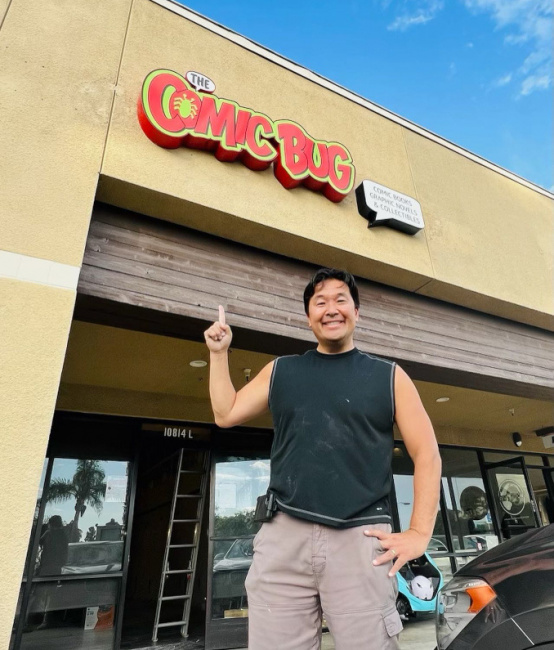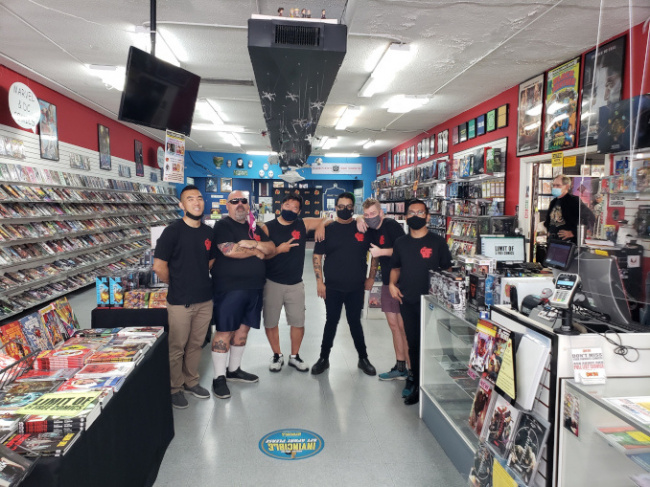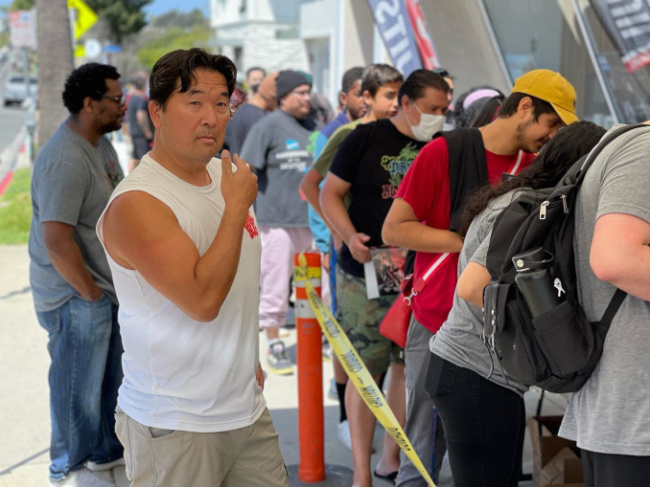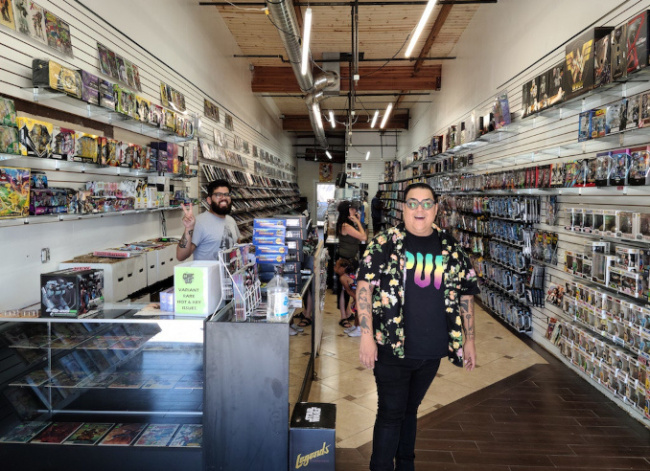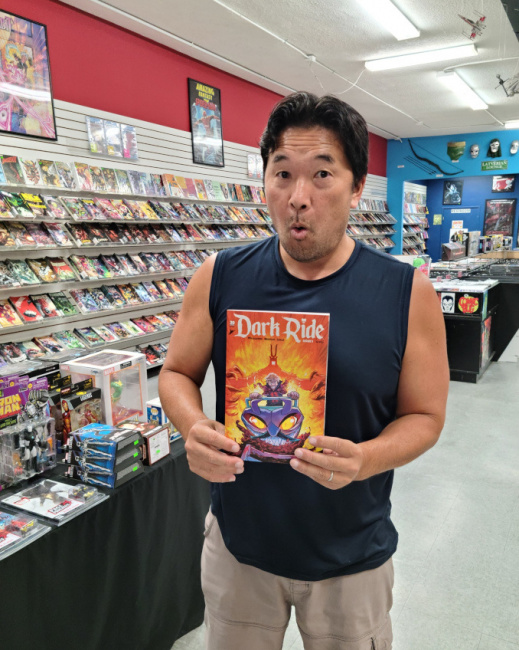In Business 3×3, a business retailer or executive will share their experience with three things they’ve done right, three things they’ve done wrong, and what else they’ve learned along the way.
Did you see the comic store owner in scrubs? There’s probably only one of them, Jun Goeku of Southern California’s Comic Bug.
Goeku is a store operator by day (and nights and weekends), and a physician’s assistant in neurosurgery by night (and days and weekends). Two full-time jobs keep him moving, so much so that Goeku has seemingly found the 25th hour in the day.
It all started in community college, when Goeku was studying business. He took a part-time job at a comic shop to pay the bills, and was eventually promoted to manager. Like so many students, Goeku’s priorities changed, and he started studying medicine. He entered that field, and also kept working at the comic store. He was satisfied by medicine but was feeling dead-ended at the comic store job.
“I figured the store was doing great and I had a lot to do with it, so I bought my own shop,” he says.
And so Goeku opened The Comic Bug in Manhattan Beach, California in 2004. He opened a second location in Culver City as well, and that Culver store has recently moved and expanded.
It’s been a wild ride, but Goeku has loved every minute. He’s also learned a lot along the way.
THE GOOD
FIND BALANCE
Two demanding, full-time jobs means that Goeku needs to be able to survey the entire field of play… and cover all the ground on that field.
“It takes a lot to run a successful comic store: Inventory, organizing the floor, cleanliness, top-notch customer service, promotions… you’ve got to be on the ball with so much,” he says. “And you have to do a little bit of everything.”
Goeku has seen the inverse example too many times.
“I’ve been to so many comic shops where they’re great in certain areas, but… displays are empty, there’s boxes all over the floor, whatever,” he says. “My thing is that you have to concentrate on everything. Find a way to devote a little bit of attention to every aspect of your store, so everything balances out.”
And Goeku has no problem getting help to create balance. He trusts his employees.
“If I’m weak in something, I’ll find an employee who’s strong in it,” he says. “I’m not going to know every product 100%, so I’ll rely on the employees who are better than me in their special areas. Or maybe some employees are better than me at promotion, organizing, decorating, whatever. If we can learn from each other, we’re a better store. Balance is good.”
LOOK AT YOUR COMMUNITY AS LARGE
Goeku also takes a holistic approach to everyone who walks through the Comic Bug doors… and even those who don’t.
“Our community consists of not just the customers, but creators, publishers, other stores and more,” he says. “One event leads to other opportunities where you meet someone you wouldn’t have otherwise, who introduces us to someone else you wouldn’t have met, and it keeps growing.”
Opening a big tent and creating community has helped Goeku in numerous ways.
“We’ve had a fire in our store; we’ve had a flood in our store,” he says. “And customers have come in and helped us out. They’ve introduced to contractors to help get stuff fixed. Community isn’t just creating somewhere fun for people to come in. It’s not just selling them comics, taking their money, and letting them walk out the door.”
And Goeku pays it forward as well.
“There was a customer years ago who came in regularly, and they started coming by less,” he remembers. “They weren’t looking too good. One day I walked him out to his car and I said, ‘Hey, I don’t mean to pry, but are you okay?’ He said he wasn’t, and started listing out some symptoms. I told him, ‘Hey, you need to get in. You need an MRI on your brain. Come into my hospital, we’ll get you checked out.’ He was worried. He was scared to know if something bad was really happening.”
Goeku didn’t see him at the hospital, but the customer indeed took action.
“Later an employee told me, ‘Hey, So-and-So came in. He said thank you for your advice, he went in, got checked out, he did have a problem, he got it fixed, and he’s doing much better.’ He told that employee I saved his life. So know your customers. Know everyone.”
DO YOUR HOMEWORK
Prep work is important to Goeku.
“I tell my employees when it comes to trying a new event, carrying a new product… study,” he says. “Ask questions. Research. See what this new thing will entail. Do your homework before you dive into something new.”
Goeku sees the time spent in advance as a small investment that pays off big.
“I try to minimize mistakes by learning all I can in advance,” he says. “I had one store owner tell me, ‘Hey, I just jump into the fire.’ Well, I don’t need to touch fire to know it burns. Don’t get burned. Don’t have so much pride or ego that you won’t ask questions.”
Again, Goeku’s network helps, and even reading columns such as this.
“I love talking to other retailers because they’ve learned things,” Goeku says. “And when they’ve made mistakes, maybe I can avoid them.”
THE BAD
DON’T BE JUST A ‘BUSINESS GUY’
Remember “find balance?” It took Goeku a while to realize his own efforts at The Comic Bug were slanted too much in one direction.
“I was a guy for many, many years doing the accounting, setting the ordering, doing the reordering, setting up events and doing all the stuff to run a business without really stopping and chatting with the customers,” he says. “I was the guy in the background. But if you’re going to run a business, you have to take the time, talk to the customers, make relationships with the creators; kinda get personal.”
Goeku has balanced that out, and is loving it.
“I think that was a huge mistake I made in my early days,” he says. “I spent years not really knowing my customers. Now knowing these people, saying ‘hi,’ calling out their name when they come in… that’s a great thing. And I appreciate my time in this business a lot more.”
REMOVE THE BAD EGGS
Goeku trusts his employees. He also trusts his gut on which ones have earned that trust. There have been mistakes…
“Sometimes, bad employees are easy to hold on to,” he says. “You know their quirks or what they’re not too good at, and you just manage it. You fall back on that old quote, ‘better the devil you know than the one you don’t.’ Well, that’s wrong. If you want to grow your business, you have to grow it with employees who share the same values, the same work ethic.”
Goeku has tried to work things out in the past, usually to a poor result.
“We think, ‘Oh, maybe they’ll learn, maybe I can teach them more,’” he says. “But usually, no. They’re not great for your business, but maybe there are things they’ll be better at. You need to help them move on to something they’ll be better at, too.”
Goeku knows it’s tough, but has got better at removing those bad eggs.
“It’s hard to do, and it’s expensive as hell to train new employees, he says. “But we’ve had employees that we should have let go that later wound up stealing and all sorts of things. They weren’t happy. Help them find something they’ll enjoy better, and we’ll be happy finding people who are a better fit for us as well.”
STAY CURRENT!
Goeku is 50 years old, so not ancient, but he’s always got one eye looking at the horizon to keep up with the times.
“We have to stay current, or we’ll be dinosaurs,” he says. “In the old days, you dealt with cash and credit cards. But now you have Google Pay, Apple Pay, PayPal, Venmo. It took us too long to get into all these other payment systems. But now we’re on board.”
And the cash register—real or virtual—rings.
“There have been plenty of times where a customer says, ‘I don’t have any money. But can I PayPal you?,’” he says. “And I’m like, ‘Hell yeah, let’s go.’”
Goeku is also cognizant of keeping his promotions and advertising current.
“In the old days, it was just the newspaper,” he says. “Now it’s Instagram, Facebook, Twitter, TikTok. There are so many ways to promote your business, promote events. You can’t rely on the old ways. You have to stay current.”
When in doubt? Again, Goeku goes to those closest to him.
“It’s a hard thing to learn. So I go to my staff and customers and ask, ‘How do you do this on Tik Tok? What’s the best way to reach people on Twitter? People are teaching me, every day.”
AND WHAT ELSE?
“Most of the time in the store, I’m in scrubs. I do a lot of long shifts, a lot of night shifts at the hospital. I go right from one job to the other. We have a lot of customers who are also in the medical field, too, so they come in wearing scrubs. We talk. It’s my tribe.”
“I can’t do everything. No one owner, no one employee, can do it all. You have to let go. Trust your employees to do some of the stuff. It may not be perfectly 100% the way I would have done it, but I’d rather get 100 things done trusting my employees than the 10 things I could get done all by myself.”
“Owners who say, ‘Man, if I could copy myself, clone myself, have more versions of me, I’d be so much better,’ I say… no, man. You’re just doing the exact same thing over and over. And your weaknesses? You’re repeating them. You’ve got to trust your employees, and you’ll learn from them.”
“In the comic business, in the game business, there are so many applicants every time we’re looking to hire. The floodgates open. And I feel bad! We’ve had multiple customers apply multiple times for positions, but you really have to look at them and what their experience is and what they bring to the table. It’s hard to tell them ‘no,’ and I don’t want them to hear it like a rejection, but we get so many applicants. And it costs so much to hire and train new employees. You have to make the right decisions. It takes a lot of work, but it’s worth it.”
“Since COVID, we do a lot more online sales. We rarely did much in the past, but staying on top of technology, we can be doing more. If selling on Facebook and eBay and Whatnot and these other avenues provides opportunity, okay. I’m using it to sell stuff we can’t sell in the store. My focus is to sell stuff in the store, and a secondary goal is to use those other avenues to sell stuff that isn’t otherwise selling. Selling online is a great way to sell stock I just can’t move. We’re not looking to be the next Mile High Comics, but to use online to move older stock; things that aren’t moving.”
“We moved into a new location beginning of October. Sales have gone up already. Rent is higher, but it’s a better location, food locations nearby, across the street from a Target, large businesses nearby, easy parking. Oh my gosh, I’m enjoying it. We moved a mile away, but have so many more walk-in customers. We’ve retained all our old customers, and are seeing so many new faces, too.”
“It was a lot of work. We closed down for just one weekend, and moved everything into the new location. It was an incredible amount of work, but totally worth it.”
“Most stores I see use a point-of-sale system, but some stores don’t; they’re still using an old-school cash register. I can’t imagine what that’s like. How do you track your sales and your product without a POS system? How do you know what to reorder? That’s insane to me.”
“When I have regular meetings with employees, the question I always ask everyone is, ‘What’s the solution?’ People like to complain about situations, but there’s a difference between complaining and talking about it. I say don’t complain. We’ll talk about it to understand what the situation is, and then we get on to finding the solution. What’s the problem; now how do we solve it?”
“Read comics and know games. That’s what we sell. We have meetings, and sometimes, we’ll just play a game. And I know that everyone reads comics, their own comics, but I always encourage employees to read more. In fact, our policy is any employee can borrow all the comics and graphic novels they want to read; just bring them back in saleable condition. The more you read, the more you know, and the better you can inform the customer.”
“The saying ‘If you love what you do, you never work a day in your life again’? Wrong. I love what I do. But we work our asses off. But we enjoy it. Life is good, dude.”
Click on Gallery below for full-sized images.
Source: ICv2


